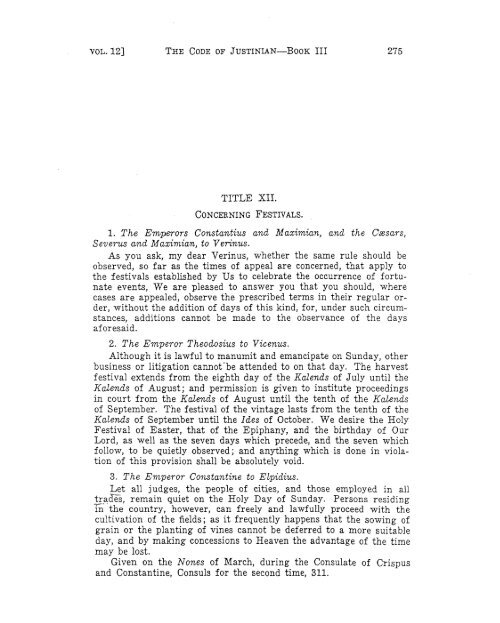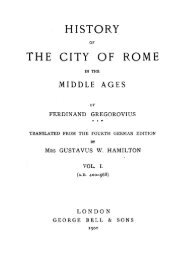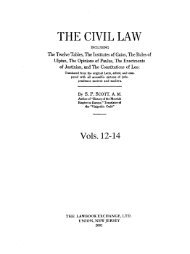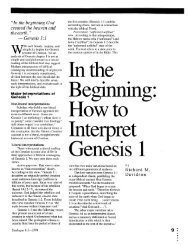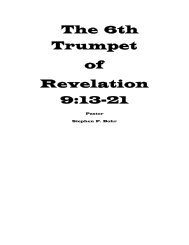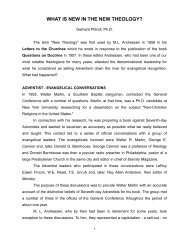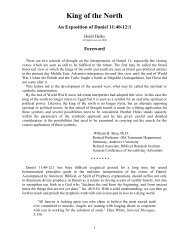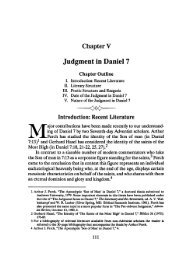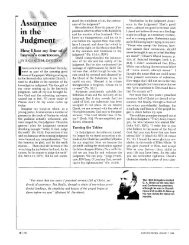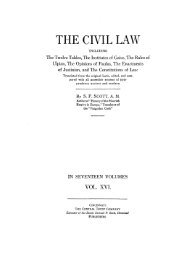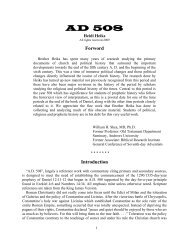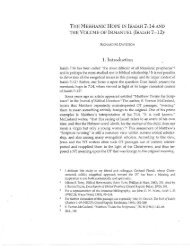Justinian's Sunday Laws
Justinian's Sunday Laws
Justinian's Sunday Laws
Create successful ePaper yourself
Turn your PDF publications into a flip-book with our unique Google optimized e-Paper software.
VOL. 12]THE CODE OF JUSTINIAN-BOOK III275TITLE XII.CONCERNING FESTIVALS.1. The Emperors Constantius and Maximian, and the Ca3Sars,Severus CLnd Maxirnian, to Verinus.As you ask, my dear Verinus, whether the same rule should beobserved, so far as the times of appeal are concerned, that apply tothe festivals established by Us to celebrate the occurrence of fortunateevents, We are pleased to answer you that you should, wherecases are appealed, observe the prescribed terms in their regular order,without the addition of days of this kind, for, under such circumstances,additions cannot be made to the observance of the daysaforesaid.2. The Emperor Theodosius to Vicenus.Although it is lawful to manumit and emancipate on <strong>Sunday</strong>, otherbusiness or litigation cannot·be attended to on that day. The harvestfestival extends from the eighth day of the Kalends of July until theKalends of August; and permission is given to institute proceedingsin court from the Kalends of August until the tenth of the K~"lendsof September. The festival of the vintage lasts from the tenth of theKalends of September until the Ides of October. We desire the HolyFestival of Easter, that of the Epiphany, and the birthday of OurLord, as well as the seven days which precede, and the seven whichfollow, to be quietly observed; and anything which is done in violationof this provision shall be absolutely void.3. The Ernperor C01'l..stantine to Elpidius.Let all judges, the people of cities, and those employed in alltrades, remain quiet on the Holy Day of <strong>Sunday</strong>. Persons residingin 'the country, however, can freely and lawfully proceed with thecultivation of the fields; as it frequently happens that the sowing ofgrain or the planting of vines cannot be deferred to a more suitableday, and by making concessions to Heaven the advantage of the timemay be lost.Given on the Nones of March, during the Consulate of Crispusand Constantine, Consuls for the second time, 311.
276 THE CIVIL LAW [VOL. 124. The Same to Severus.No judge shall presume to appoint festival-days by his own authority.Such festivals as a ruler establishes shall be called Imperialholidays, and therefore if they are deprived of the name they shouldalso be deprived of the benefit.Given during the Ides of April . . .5. The Emperors VaJentinian, Valens, and Gratian to Olybrius., You must proceed with criminal and fiscal cases during the twomonths of festivals, that is to say, without any interruption.(1) Hereafter, also, during these same days, examination shallbe made of matters in which bakers are interested.Given on the fourth of the Nones of May, during the Consulateof the Noble Prince Valentinian, 368.6. The Emperors Gratian, Valentinian, and Theodosius to Lucianus,Vicegerent of Macedonia.Every investigation of criminal matters shall be prohibited duringthe four days which precede the auspicious season of the ceremoniesof Easter.Given at Thessalonica, on the sixth of the Kalends of April, duringthe Consulate of Gratian, Consul for the sixth time, and Theadosius,Consul for the first time.7. The E1nperors Valentinian, Theodosius, and Arca.ditlS to Albinus,Urban Prefect.We order that all days shall be proper for the administration ofjustice, and that only those shall be considered holidays, which, durthetwo festival months, the year seems to set apart for rest fromlabor; that is, the days of summer, in order to be better able to endurethe heat; and those of autumn, for the purpose of gathering fruit.We also devote to leisure the days of the Kalends of January,whicll it is customary to observe for this purpose, and to these We addthe days of the foundation of the great of Rome and Constantinople,during which the administration of justice should be suspended,because it owes its origin to them. We include in the samecategory the sacred day of Easter, and the seven which precede andfollow it; the day of the Nativity, and that of the Epiphanies ofChrist; and the time when the commemoration of the Apostolic Passionof all Christianity is properly celebrated by the entire world.During the above-mentioned most holy days, We do not permitany public exhibitions to be given. The.J1ay sacred to the sun, towhich the ancients very :properly gave the name of <strong>Sunday</strong>, whichreturns after a certain period of revolution, must also be respected,80 that there shall be no investigation of legal disputes on that day,either before arbitrators or judges, whether they have been appointedor voluntarily chosen.This rule shall also apply to the days which We first saw the light,or which witnessed the origin of the Empire. During the fifteen days
VOL. 12] THE CODE OF JUSTINIAN-BoOK III 277of the celebration of Easter, compulsory distribution of provisionsand the collection of all public and private obligations shall be postponed.Given at Rome, on the second of the Ides of August, during theConsulate of Timasius and Promotus, 389.8. The San~e to Tatia1~, Pr33toria1~ Prefect.All employments, whether public or private, shall be suspendeddur.ing the fifteen days of the Festival of Easter; still, every personshall have the right of emancipation and manumission during thattime, and any proceedings relating to them are not prohibited.Given on the Kale11ds of January, under the Consulate of Arcadius,Consul for the second time, and Rufinus, 392.9. The Emperors Honorius an,d Theodosius to Antherni~~8, Pra:-toTian Prefect.The Governors of provinces are notified that, so far as the tortureof robbers, and especially of Isaurians is concerned, they must notthink that any of the forty days of Lent, or the venerated Festivalof Easter should be excepted, lest the betrayal of the designs of thecriminals, which might be obtained by torture, may be deferred. Thisshould the more readily be accomplished, as, during this time, thereis greater hope of pardon by the Almighty, and the health and safetyof many persons are secured.Givel1 at Constantinople, on the fifth of the Kalen.ds of March,during the Consulate of Bassus and Philip, 408.10. The ErJ'Lperors Leo a?~d Anthel1ti·us to Armasius, Prf13torianPrefect.We do not wish holidays dedicated to the majesty of God to beemployed in public exhibitions, or be profaned by any annoyancesresulting from collections.(1) Hence We decree that <strong>Sunday</strong> shall always be honored andrespected, and exempt fron1 all executions. No notice shall be servedupon anyone; no security shall be exacted; bailiffs shall remain quiet;advocates shall cease to conduct cases, and this day shall be freefrom the administration of justice; the harsh voice of the public criershall be silenced; litigants shall have a respite from their disputes,and enjoy the interval of a truce; adversaries may approach one anotherwithout fear; repentance will have an opportunity to' occupytheir minds, they can enter into agreements and discuss compromises..We do not permit persons ~Tho are at leisure during this sacredd.ay to devote themselves to obscene pleasures; and no one shall thendemand theatrical exhibitions, the contests of the circus, or the melancholyspectacle of wild beasts; and when Our birthday happens tofallon <strong>Sunday</strong>, its celebration shall be postponed. If anyone shouldthink that upon this holiday he can venture to interest himself in exhibitions;or the subordinate of any judge, should, under the protestof any public or private business, violate the provisions of this law, he
278 THE CIVIL LAw [VOL. 12shall suffer the loss of his employment and the confiscation of hisproperty.Given at Constantinople, on the Ides of September, during theConsulate of Zeno and Martian, 469.


